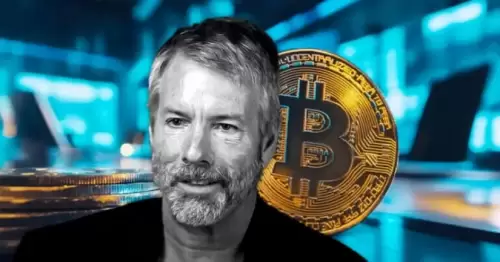 |
|
 |
|
 |
|
 |
|
 |
|
 |
|
 |
|
 |
|
 |
|
 |
|
 |
|
 |
|
 |
|
 |
|
 |
|
Cryptocurrency News Articles
Bitcoin Will Become the World's Reserve Asset 'Much Sooner Than People Think'
May 09, 2025 at 11:00 am

David Bailey, chief executive of Bitcoin Inc. and confidant of US President Trump, mapped out a trajectory that he believes will carry the world’s first cryptocurrency from insurgent technology to primary reserve asset “much sooner than people think.”
Speaking on The Scoop with host Frank Chaparro, Bailey described a confluence of political opportunism, sovereign-scale mining, and balance-sheet securitisation that, in his view, is steadily eroding the old monetary order.
Bailey did not mince words about the scale of the transition. “We are on a path for Bitcoin becoming the reserve asset of the world,” he said, adding that the timetable is accelerating. The claim framed a discussion that ranged from Trump’s newly discovered “Bitcoin president” persona to Bhutan’s dependence on block-subsidy revenue and SoftBank’s entrance into the treasury-stock arbitrage game.
Trump's Bitcoin Pivot
Bailey recounted his first meeting with Trump at Trump Tower, where he and others attempted to fold Bitcoin into the president’s platform. The encounter, he said, revealed an instinctive political antenna. Trump “has this ability to sort of flip his persona […] from joking and having a good time […] to business Trump, decision time.”
What began as a meme-driven overture has, in Bailey’s telling, evolved into a reflexive campaign plank. The candidates for president in 2024 are “all over the crypto issues now because they're a big voting bloc. It's heating up on the campaign trail because of the constituency.”
That pivot matters, Bailey argued, because the constituency is already electorally significant. “Crypto Americans […] are 90 million people, 80 million people,” he told Chaparro. Trump, he added, believes the cohort is “more fervent and there’s more of us than gun owners.” The implication is that Bitcoin’s ideological freight—“the politics of not wanting politics,” as Bailey put it—has begun to acquire conventional muscle at the ballot box.
If politics provides the narrative, energy provides the cash flow. Bailey said sovereign mining has crossed an inflection point, estimating that “about 50 countries” now run public-private mining ventures drawing on excess generating capacity. Scale, he suggested, is no longer trivial: qualifying nations are “using like 100-plus megawatts of power,” with some “using gigawatts.”
The Himalayan kingdom of Bhutan is Bailey’s canonical example. Bitcoin mining there now accounts for “50% of the GDP of the country […] it might even be higher.” Such dependence, he argued, turns hash-rate exports into a pillar of fiscal solvency, but it also up-ends competition for commercial miners. Competing with a sovereign that “has no cost basis for its energy” compresses margins for everyone else.
Sovereign Energy Drives Bitcoin Mining
Sovereign accumulation naturally follows sovereign production, Bailey contended. Once a government controls block rewards, the internal question shifts to custody, sale-versus-retention, and institutional mandate.
While only El Salvador and the Central African Republic have publicly adopted Bitcoin as legal tender or reserve asset, Bailey asserted that “sovereign money is flowing into [the] Bitcoin market already in pretty significant size,” some of it routed through sovereign-wealth funds rather than central banks.
He linked that flow to an emergent national-security framing. “Is it a national-security issue for your country not to have [… ] the dominant reserve asset? Yeah, definitely.” Defence establishments, he hinted, have begun weighing whether Bitcoin strengthens or undercuts existing security doctrines, a debate he expects to surface in US congressional testimony later this year.
The Strategy Template
At the corporate level, Michael Saylor’s Strategy remains the reference model.
Bailey said Saylor’s playbook—issuing equity or debt, buying Bitcoin, letting market-capitalisation premia offset dilution—has already been copied “widely all over the place.” By his count, “we’re probably pushing 200” listed companies running variations of the strategy; he projects “many hundreds” by year-end. The supply-demand consequences are, in Bailey’s view, transparent: “There’s just not enough Bitcoin marginally to be satisfied at this price. The price is going to have to go way up.”
The mechanism is not without systemic risk. Bailey likened the corporate-Bitcoin trade to the closed-end trust structure that once governed GBTC, while emphasising a crucial distinction: operating companies can repurchase their own shares if they slip to a discount. Even so, he warned that widespread share-collateral lending could propagate leverage across equity markets, making a severe Bitcoin drawdown a potential trigger for global deleveraging.
“A bear market in Bitcoin could cause financial contagion […] and there’s really nothing anyone can do to stop it.”
Throughout the interview Bailey returned to institutional fragility. “These institutions are way weaker and way more
Disclaimer:info@kdj.com
The information provided is not trading advice. kdj.com does not assume any responsibility for any investments made based on the information provided in this article. Cryptocurrencies are highly volatile and it is highly recommended that you invest with caution after thorough research!
If you believe that the content used on this website infringes your copyright, please contact us immediately (info@kdj.com) and we will delete it promptly.





























































